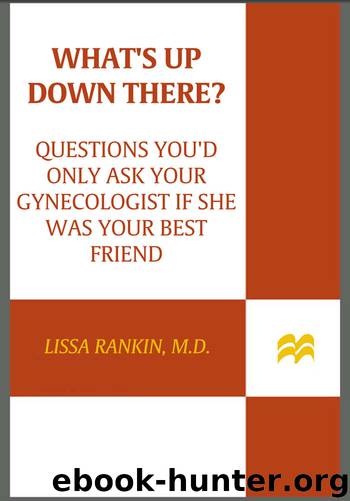What's Up Down There? by Lissa Rankin MD

Author:Lissa Rankin, MD
Language: eng
Format: epub
ISBN: 9781429943314
Publisher: St. Martin's Press
Is it possible to freeze your eggs if you’re getting older and you’re not ready to get pregnant yet?
Wouldn’t that be perfect if we could harvest our eggs when we’re Fertile Myrtle twenty-year-olds? Then, when we’re settled into our careers, we can thaw them and have babies. Ah . . . that would solve everything, right?
Well, not exactly. Yes, it’s possible to freeze your eggs. But lest you think it’s a surefire way to guarantee your future fertility, it’s important to know that it’s still considered experimental.
The process is called “oocyte cryopreservation,” and it requires getting hormone injections to stimulate the production of multiple eggs and going through an egg retrieval procedure to harvest the eggs (sucking the eggs out of the ovary through a long, skinny needle inserted into the vagina under ultrasound guidance). Essentially, you’re making it possible to serve as your own egg donor when you finally get around to reproducing.
So why isn’t every single thirtysomething freezing her eggs? First, because having eggs on hand doesn’t guarantee that they will result in a baby, according to James Grifo, M.D., Ph.D., who is the program director at the NYU Fertility Center. NYU was recently able to achieve pregnancy rates equivalent to a fresh IVF cycle. In their program, they estimate that a woman who freezes her eggs under thirty-six years of age will have approximately a 50 percent chance of giving birth to a baby from a single cycle of egg freezing. As women get older, the success rates drop. For instance, a thirty-eight-year-old can expect a 39 percent rate, a forty-year-old 27 percent, and a forty-two-year-old 14 percent. The younger you are, the better.8
While this is good news for women with cancer who might lose their fertility—as well as women wishing to delay motherhood—Dr. Grifo acknowledges that you wouldn’t want to put all your eggs in one basket, so to speak. If you freeze your eggs in your early thirties, thinking you’ll be able to become pregnant later, you might wind up very disappointed if you’re in the 50 percent who are unable to conceive ten years later. And keep in mind that many fertility centers cannot match the success rates found at NYU. Many are much lower. In addition, egg preservation will cost you a pretty penny. And buyer beware: There are many expensive commercial programs offering fertility preservation without any successful pregnancies. Ask how many live babies have resulted from their oocyte cryopreservation program. If they can’t give you a straight answer, go elsewhere.
Download
This site does not store any files on its server. We only index and link to content provided by other sites. Please contact the content providers to delete copyright contents if any and email us, we'll remove relevant links or contents immediately.
| Breast Cancer | Candida |
| Chronic Fatigue Syndrome & Fibromyalgia | Endometriosis |
| General | Lupus |
| Menopause | Menstruation |
| Postpartum Depression | Pregnancy & Childbirth |
| Sexual Health |
Name Book, The: Over 10,000 Names--Their Meanings, Origins, and Spiritual Significance by Astoria Dorothy(2987)
Tone Your Tummy Type by Denise Austin(2847)
The Ultimate Guide to Anal Sex for Women by Tristan Taormino(2298)
The Expectant Father by Armin A. Brott & Jennifer Ash(2273)
The Coregasm Workout by Debby Herbenick(2272)
The Women's Health Fitness Fix by Jen Ator(2242)
Expecting Better by Emily Oster(2212)
She-ology by Sherry A. Ross MD(2165)
The Hite Report on Shere Hite by Shere Hite(2066)
Woman: An Intimate Geography by Natalie Angier(1940)
8 Steps to Reverse Your PCOS by Fiona McCulloch(1915)
Birth by Tina Cassidy(1905)
The Female Brain by M.D. Louann Brizendine(1901)
101 Get-Lean Workouts and Strategies by Muscle & Fitness(1870)
Women & the Weight Loss Tamasha by Diwekar Rujuta(1801)
50 Ways to Soothe Yourself Without Food by Susan Albers(1792)
The Big Booty Blueprint: Your Guide To A Bigger Butt In Less Than 12 Weeks by Bella Rahbek & Brandon Carter(1672)
The overachievers by Robbins Alexandra(1581)
Unleash the Power of the Female Brain: Supercharging Yours for Better Health, Energy, Mood, Focus, and Sex by Daniel G. Amen M.D(1576)
